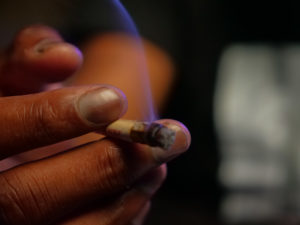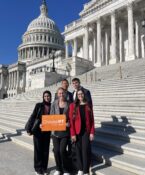School of Public Health’s Dr. Andrew Yockey examines drugged driving

In the past year, an estimated 2% of adolescents ages 16-17 drove under the influence of alcohol, 5.65% drove under the influence of marijuana and .48% drove under the influence of drugs other than marijuana.
Those are just some of the eye-opening results of a new article on drugged driving by Dr. Andrew Yockey, an assistant professor in The University of North Texas Health Science Center at Fort Worth’s School of Public Health. Yockey’s article, Drugged driving among U.S. adolescents, 2016–2019, USA, was published in October.
Yockey, who works in SPH’s Department of Biostatics and Epidemiology and specializes in adolescent health research and health equity, said he was drawn to the subject because it represents a growing trend that remains dangerously under-researched for the US adolescent population.
“Drugged driving results in more accidents than drunk driving,” Yockey said. “Given the recent rise in drugged driving reports across the country, more research is warranted to highlight the current gaps in the literature surrounding this problem.”
Drugged driving refers to the operation of a vehicle while under the influence of illegal drugs and alcohol. Driving under the influence can negatively impact coordination, reaction time, tracking, judgment, attention and perception. The impairing effects of drugs may vary from person to person based on their tolerance as well as different drug-to-drug and drug-to-alcohol interactions.
For his research, Yockey used information from various analyses of the 2016–2019 National Survey on Drug Use and Health, which includes results taken from 17,520 adolescents ages 16-17.
“Nearly 6% of youth ages 16-17 reportedly drove under the influence of marijuana in the past year,” Yockey said. “This is super alarming, considering the negative health effects, such as impaired time perception of driving under the influence of marijuana.”
Among all populations across the country, incidents of drugged driving have steadily increased at an alarming rate for nearly two decades. A recent study by the National Highway Traffic Safety Administration found that 55.8% of people seriously injured or killed in road crashes tested positive for one or more drugs.
“Dr. Yockey’s work highlights a growing concern affecting the health and well-being of our youth,” said Dr. Shafik Dharamsi, dean of the School of Public Health. “Drugged driving puts not only the driver at great risk but also passengers and others who are on the road. We must work with and alongside our youth, our teachers, parents, law enforcement officers, and community leaders to raise awareness and collaboratively develop prevention initiatives that are relevant, transformative, compassionate and caring”
As recently as 2019, Yockey’s article says, an estimated 2,400 adolescents in the United States died due to vehicle-car collisions, making it the leading cause of death among adolescents.
Risk factors that lead to drugged driving are complex, but evidence points toward a multi-faceted combination of cultural, psychosocial and other components. For example, Yockey’s piece cites a study that found sensation-seeking, negative emotional driving and impulsivity were significant associations to driving under the influence of cannabis. Another study he cited that examined the issue in Spain found that greater family problems and disruptions, prior drug use and identifying as male were strong predictors of driving under the influence.
The number of drugged drivers varied according to race, age and geography.
“I hope this study will lead to governmental legislation and health initiatives aimed at decreasing drugged driving and increasing awareness of this growing problem among youth,” Yockey said.





Social media